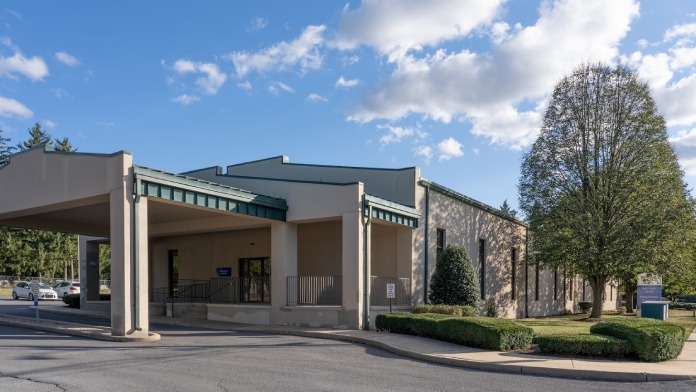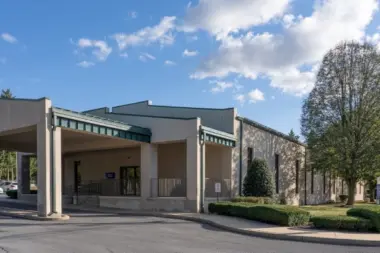About WellSpan Behavioral Health – Chambersburg
WellSpan Behavioral Health is a network across several counties in Pennsylvania. They have an outpatient center in Chambersburg that treats adults and children. This place specializes in behavioral health services including addiction counseling and mental health support.
It’s pretty neat that their location is fully accessible. There’s plenty of parking and wide open spaces for those who might need assistance with mobility. It’s also in a secluded part of town for privacy. The Trojan Stadium isn’t too far away.
Medication Management Services
Medication management is one way that they make sure you don’t overdose. They’ll monitor your drug intake and make adjustments according to the doctor’s orders. That way, you don’t become dependent or end up taking too much or too little of your prescriptions.
Licensed Therapists, Psychiatrists and Counselors
I’m also impressed that they have plenty of counselors and psychiatrists at this location who can assist you. They specialize in behavioral medicine to address bipolar disorders, anxieties and phobias. That way, if your addictions are fueled by underlying mental health conditions, they can pinpoint those triggers.
If your condition is acute, they can also refer you to other places within their network. There are hubs for inpatient care and crisis interventions that aren’t too far away.
Services can be paid for through most major insurance plans. They also offer financial assistance and will work with you to assess insurance coverage and payment options.
WellSpan is located near Chambersburg Memorial Park so you can exercise and clear your mind between treatment sessions. They are also close to the downtown region so that you can reacquaint yourself with your community and socialize with your neighbors and family in local hotspots.
Latest Reviews
Rehab Score
Gallery


Other Forms of Payment
Private insurance refers to any kind of healthcare coverage that isn't from the state or federal government. This includes individual and family plans offered by an employer or purchased from the Insurance Marketplace. Every plan will have different requirements and out of pocket costs so be sure to get the full details before you start treatment.
Self-pay involves paying for treatment out of your own pocket. You can use savings or credit, get a personal loan, or receive help from family and friends to fund your treatment. If you don't have insurance or your insurance plan doesn't cover a specific program, self-pay can help ensure you still get the care you need.
Financial aid can take many forms. Centers may have grants or scholarships available to clients who meet eligibility requirements. Programs that receive SAMHSA grants may have financial aid available for those who need treatment as well. Grants and scholarships can help you pai for treatment without having to repay.
Medicare is a federal program that provides health insurance for those 65 and older. It also serves people under 65 with chronic and disabling health challenges. To use Medicare for addiction treatment you need to find a program that accepts Medicare and is in network with your plan. Out of pocket costs and preauthorization requirements vary, so always check with your provider.
Medicaid is a state based program that helps lower-income individuals and families pay for healthcare. Medicaid covers addiction treatment so those enrolled can use their coverage to pay for rehab. When a program accepts Medicaid the client often pays very little or nothing out of their own pocket.
Addiction Treatments
Levels of Care
Outpatient Programs (OP) are for those seeking mental rehab or drug rehab, but who also stay at home every night. The main difference between outpatient treatment (OP) and intensive outpatient treatment (IOP) lies in the amount of hours the patient spends at the facility. Most of the time an outpatient program is designed for someone who has completed an inpatient stay and is looking to continue their growth in recovery. Outpatient is not meant to be the starting point, it is commonly referred to as aftercare.
Treatments
Mental health rehabs focus on helping individuals recover from mental illnesses like bipolar disorder, clinical depression, anxiety disorders, schizophrenia, and more. Mental health professionals at these facilities are trained to understand and treat mental health issues, both in individual and group settings.
Programs
Adult rehab programs include therapies tailored to each client's specific needs, goals, and recovery progress. They are tailored to the specific challenges adult clients may face, including family and work pressures and commitments. From inpatient and residential treatment to various levels of outpatient services, there are many options available. Some facilities also help adults work through co-occurring conditions, like anxiety, that can accompany addiction.
Young adulthood can be an exciting, yet difficult, time of transition. Individuals in their late teens to mid-20s face unique stressors related to school, jobs, families, and social circles, which can lead to a rise in substance use. Rehab centers with dedicated young adult programs will include activities and amenities that cater to this age group, with an emphasis on specialized counseling, peer socialization, and ongoing aftercare.
Clinical Services
Group therapy is any therapeutic work that happens in a group (not one-on-one). There are a number of different group therapy modalities, including support groups, experiential therapy, psycho-education, and more. Group therapy involves treatment as well as processing interaction between group members.
In individual therapy, a patient meets one-on-one with a trained psychologist or counselor. Therapy is a pivotal part of effective substance abuse treatment, as it often covers root causes of addiction, including challenges faced by the patient in their social, family, and work/school life.
Whether a marriage or other committed relationship, an intimate partnership is one of the most important aspects of a person's life. Drug and alcohol addiction affects both members of a couple in deep and meaningful ways, as does rehab and recovery. Couples therapy and other couples-focused treatment programs are significant parts of exploring triggers of addiction, as well as learning how to build healthy patterns to support ongoing sobriety.
Research clearly demonstrates that recovery is far more successful and sustainable when loved ones like family members participate in rehab and substance abuse treatment. Genetic factors may be at play when it comes to drug and alcohol addiction, as well as mental health issues. Family dynamics often play a critical role in addiction triggers, and if properly educated, family members can be a strong source of support when it comes to rehabilitation.
Staff

Roxanna L. Gapstur, PhD, RN
President & CEO

Anthony Aquilina, DO
Executive VP & Chief Physician Executive

Laura Buczkowski
Executive VP & CFO

Cynthia Fruitrail
Executive VP & Chief Strategy Officer

Kasey Paulus
Executive VP & COO

David Vega, MD
Senior VP & Chief Medical Officer
Contact Information
176 South Coldbrook Ave
Suite 2
Chambersburg, PA 17201